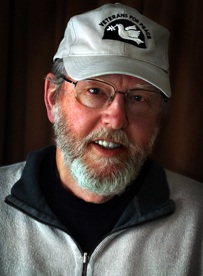After the crowd marched around the block and sidled up against the White House fence, the park police began systematically putting up metal barriers to designate a pre-ordained part of the public sidewalk as an arrest zone. Next, they began shooing people who didn't want to be arrested across the street back to Lafayette Park. There was some confusion when an officer informed five people by the fence who intending to be arrested that they were in the wrong area, and if they stayed where they were they would face a different, harsher charge from those in the designated arrest zone.
"Hey, thanks for telling us," someone said to the cop.
Members of the media had a special zone off to the right. In my case, since I'm a member of Veterans For Peace and consider myself a working journalist, I had to decide where I would make my final stand. For the record, I chose not to stay in the arrest zone, to pass on the media zone and to remove myself to the people's zone in the park.
Those choosing to remain by the fence and get arrested had further choices. Once they were cuffed with white plastic straps, they could either walk or be politely dragged on their heels to the buses. Then they had to decide to either pay a $100 fine to the city coffers (all that police weekend overtime costs money) or refuse the fine and be prepared to return to Washington DC for hearings and a trial.
Most protesters were unaware of the grave news unfolding a world away -- the beginning of a new war in Libya. They certainly grasped its implications for their future as Americans living in a nation facing a host of neglected domestic problems. And, as came as no surprise to this crowd, elements of the Arab League later expressed shock at the extent and fearsomeness of the US aerial assault. It was a case of Militarism lurching against its civilian leash and dragging the nation into a future of more unanticipated consequences.
Given such a condition of compounding war, two of the Lafayette Park speeches took on added meaning. Ralph Nader and Chris Hedges each addressed different facets of the peace and anti-war movements. In some ways their approaches were at odds; while in others, they seemed two sides of the same coin.
Nader was up first. He was rumpled as usual in a dark overcoat. He recalled the Vietnam War and how it had finally been brought to a close when Congress cut off the money to run the war. He talked about serious political nuts and bolts. What he drove home over and over was that what we all had to do today was get more involved in politics. The military was not going to stop fighting wars until Congress cut off the spigot that funded them.
"We have to dig down deeper into our communities," he said.
(Note: You can view every article as one long page if you sign up as an Advocate Member, or higher).




